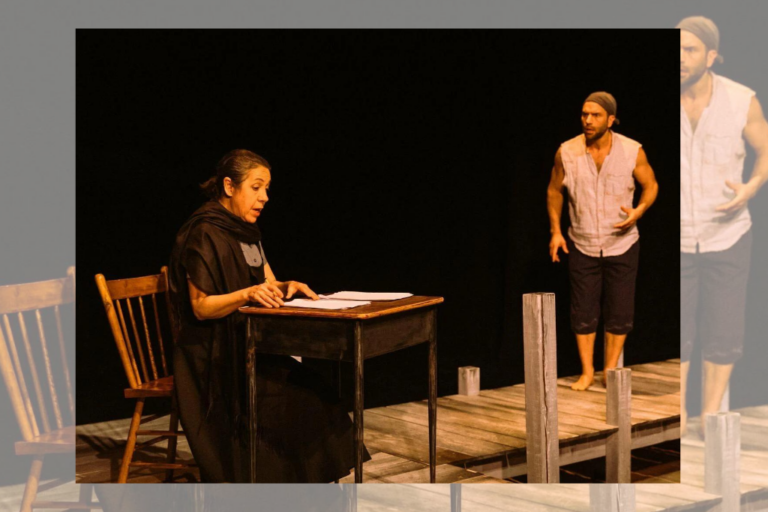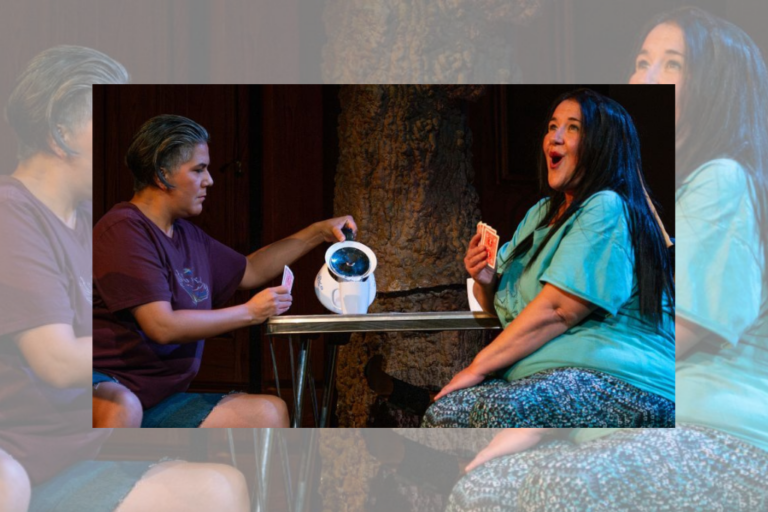REVIEW: Guildwood and Dead Parents Society traverse time and genre to examine community
What I’ve learned about the recent success of Bo Burnham’s Inside and films like Whiplash and La La Land is that audiences love seeing artists make art about being artists. The struggle for self-discovery and expression is universal, and the need to be creative and find community in turbulent times always seems to feel relevant.
Written and directed by Braeden Soltys, Guildwood is a musical featuring 11 actor-musicians who play a mix of real and fictional members of “The Guild of All Arts,” a Scarborough-based artist commune that is about to be taken over by the military during World War II. It’s the impulse for community within, rather than the history of the Guild, that’s the focus of this Garner Theatre Productions and Guildwood Collective production.
With a large cast, there is no time wasted. The set changes are fast, and the instrumentalists/vocalists enter and leave the space as needed for each musical number. Although the story doesn’t explore every relationship thoroughly, the chemistry within the entire ensemble is palpable, including the five unnamed ensemble members who make moments like a set change or a choreographed dance sequence feel as if they could really live within the world of the Guild.
The most compelling relationship is between Faye (Camilo Diaz-Varela) and Violet (Krysline- Mai Ancheta). Even before exploring their dynamic, this duo has great chemistry which pays off in their first duet “It Could Be You” and a later heartbreaking reprise. Early in the show, there’s an endearing moment between Guild members who recount the love story of group founders Rosa and Spencer. Just by seeing Faye and Violet step into those roles briefly, I understood the love between them, Rosa and Spencer, and within the entire group.
Overall, I feel the entire piece is missing some conflict. When reading the program, I was excited to see how the historical context would manifest on stage, but the intensity of those situations never fully seeped into the plot of the show.
In Guildwood, Rose and Spencer may be generous people with philanthropic intentions, but they come from rich, political families and don’t need the Guild the way the other characters do. Tension arises between the couple and several artists across generations, social classes, and beliefs. Within this array of characters is Foster (Taran Kim), the young revolutionary who frequently vocalizes his distaste for the Canadian government’s involvement in the war, its displacement of the Guildwood residents, and even Rosa and Spencer for ultimately “giving up.” When Foster finally calls Rosa out on her privilege, the story moves on so quickly that it leaves the production feeling at times politically lukewarm.
Further, with the built-up tension between Violet, a pacifist and Faye, who has secretly enlisted, I spent the entire show waiting for a big blowout that came and went too quickly. Since I was so invested in their relationship, I would’ve found it more compelling to see them live in that opposition or struggle to power through it. Because Guildwood leans away from the impact of displacement and war, the production perhaps misses an opportunity to meaningfully explore this distinctly Canadian story during WWII.
Still, Guildwood captures the heart of the Guild. As different instrumentalists and voices join in, the tight-knit community dynamic of the Guild materializes on stage. The folky music and accompanying choreography (by Meghan Caine, Sierra Holder, and Tyler Pearse) are perfectly aligned with the world of the Guild, as if the members of Guildwood themselves created this musical to tell their own story.
Although I wasn’t completely sold on the importance of Guildwood as an institution or the need to tell this story right now, I could definitely feel the importance of Guildwood to the characters within this world.
After an hour of consistent laughter, the house lights came up to reveal that many people in the audience were either wiping away tears or comforting the person beside them. So, either everyone in the audience has a dead parent, or Dead Parents Society is really just that great.
Dead Parents Society: A Dark Sketch Comedy Revue features a variety of sketches interwoven with storytelling monologues and the occasional musical number. The dead parents society is an exclusive group we’re all going to join one day. Morbid, sure — but this reminder at the top of the show confronts the inevitability that makes these unique and tragic circumstances hilarious and emotionally impactful.
Much of the humour comes from all the strange and honest ways people act when they’re grieving, and the often inappropriate ways those around them respond. Playing a grief management employee, Sicilia “supports” a peer by gifting them a plastic plant (so the gift won’t die on them) and subsequently expressing all the ways that the person can avoid inconveniencing the rest of the office.
Yikes.
I’ve never been on the receiving end of such comments, but the sheer ridiculousness of the sketch made me reconsider how absurd such exchanges could feel to someone actually grieving. The characters invite the audience to consider how they’ve dealt with both sides of this scenario.
Throughout the show, there are moments in which the actors joke about their actual deceased parents. By balancing the ridiculousness of the sketches with the more grounded comedy of these monologues, Dead Parents Society contextualizes the fictional scenes within each group member’s stages of grief.
Along with the stand-alone sketches is the recurring character of the “Grief Fairy” (McMaster) who visits a man (Chiu) at various points throughout the show to remind him of his father’s death. The Grief Fairy pops in at hilariously inappropriate times, and the man’s equally hilarious reactions range from annoyance, anger, depression, and finally — acceptance.
Despite its serious subject matter, the cast doesn’t try to make you cry. There are no long sentimental sequences with stark cuts to jokes or vice versa. Instead, Dead Parents Society balances the funny with the sincere, successfully showcasing the humour of grief rather than forcing it. At its core, the show’s quite specific humour comes from its inherent universality. Some people lose a parent at a young age, and generally speaking, everybody will lose both. Since the entire show deals with this one topic, it’s difficult to not imagine how one may feel when that time comes.
Whether of laughter, sadness, or sympathy — there will be tears. And is that not what Aristotle said theatre was for?
Next Stage Theatre Festival ran at Buddies in Bad Times Theatre from October 18 to 29. You can learn more about the festival here.
Intermission reviews are independent and unrelated to Intermission’s partnered content. Learn more about Intermission’s partnership model here.












Comments